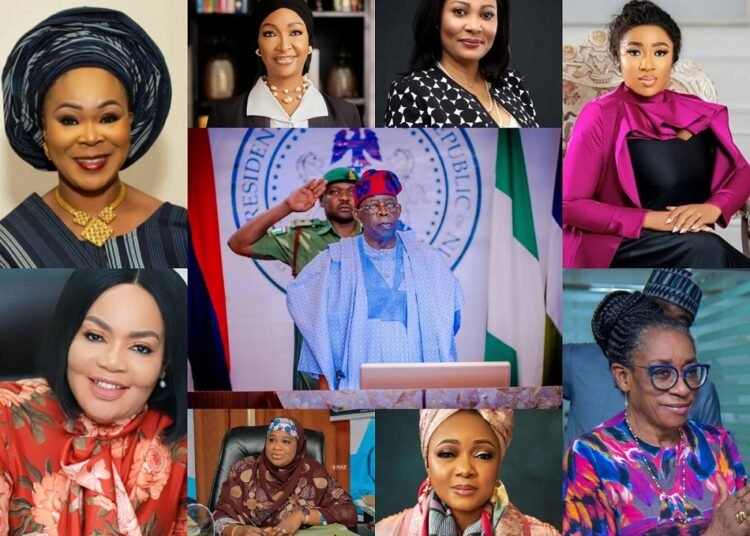Nigeria, like many countries, grapples with the underrepresentation of women in both elective and appointive positions, raising concerns among citizens. In alignment with international commitments and the National Gender Policy’s call for affirmative action, efforts have been intensified to bridge this gender gap.
President Tinubu, cognizant of the need for inclusive governance, has made strides in appointing female ministers, showcasing a modest yet significant increase compared to the previous administration.
In Nigeria, the extant National Gender Policy (NGP) recommended 35% affirmative action instead and sought a more inclusive representation of women with at least 35% of both elective political and appointive public service positions respectively.
The national average of women’s political participation in Nigeria has remained at 6.7 percent in elective and appointive positions, which is far below the Global Average of 22.5 percent, Africa Regional Average of 23.4 percent and the West African Sub Regional Average of 15 percent (Oloyede Oluyemi 2015).
Despite persistent challenges rooted in societal norms and historical biases, the re-introduction of democratic governance in Nigeria has provided a platform for women’s increased participation.
President Tinubu’s commitment to driving inclusion is evidenced by the appointment of eight capable and deserving female ministers in his administration, a significant increase of 1.0 from the previous government.
Context and Historical Perspectives
The historical underrepresentation of women in Nigerian politics can be traced back to patriarchal norms that relegated women to traditional roles.
Post-colonial influences further hindered women’s progress, with challenges including stigmatization, low educational levels, meeting schedule conflicts, financial constraints, and political violence.
The persistent influence of religious and cultural barriers, where women are often seen as submissive and not suited for public roles, has also contributed to this imbalance.
In response to the persistent underrepresentation of women in both elected and appointed positions within the Nigerian political landscape, a series of concerted efforts have been undertaken.
Some of these initiatives include the establishment of key entities such as the Women Political Empowerment Office, the Nigeria Women Trust Funds, and dedicated Women Lobby Groups. Complementing these organizational endeavours, the Independent National Electoral Commission (INEC) has implemented a gender policy, fostering a more inclusive political environment.
Concurrently, national multi-stakeholder dialogues have been convened, alongside various interventions aimed at realizing affirmative action.
The Nigeria Women Strategy Conference has played a pivotal role in strategizing and coordinating efforts towards enhancing female political participation.
Collaborative endeavors between the National Center for Women Development and the National Bureau of Statistics seek to gather evidence-based data, addressing the current lack of harmonized information on the subject. The ongoing data collation spans the period from 1999 to 2015.
Policy Recommendations
To address these challenges, Mrs. Oloyede Oluyemi in her paper on ‘Monitoring women’s participation in politics’, recommended several key strategies. Political parties according to her must establish support networks for aspiring female politicians, providing mentorship and capacity building.
Building mass coalitions and support groups can amplify the voices of women in politics, while legal funds should be established to challenge electoral malpractices.
Also, introducing a quota system at all government levels and engaging stakeholders to ensure its strict adherence are crucial steps towards achieving gender parity.
As at September 2023, President Tinubu had appointed eight capable and deserving female ministers, reflecting a positive shift towards gender inclusivity.
The eight distinguished women appointed by President Tinubu are contributing significantly to the government’s agenda for a renewed Nigeria. These accomplished individuals hail from diverse professional backgrounds, bringing a wealth of experience and expertise to their respective portfolios.
The following list provides the names and roles of the eight female ministers serving in Tinibu’s government:
- Doris Uzoka-Anite: Minister of Industry, Trade and Investment
- Uju Kennedy Ohanenye: Minister of Women’s Affairs
- Nkiruka Onyejeocha: Minister of State, Labour and Employment
- Betta Edu: Minister of Humanitarian Affairs and Poverty Alleviation
- Hannatu Musawa: Minister of Art, Culture and the Creative Economy
- Mahmoud Mariya: Minister of State, Federal Capital Territory
- Imaan Sulaiman-Ibrahim: Minister of State, Police Affairs
- Lola Ade-John: Minister of Tourism
The appointment of eight female ministers by President Tinubu is a commendable step towards fostering gender diversity in government. With these appointments, the percentage of female ministers stands at 17.78%, indicating progress from the previous administration.
However, this figure falls short of the National Gender Policy (NGP) recommended 35% affirmative action for appointive public service positions. Therefore, there’s a need to level up efforts to cover the 17.22% as the NGP has recommended.
The efficiency demonstrated by these female ministers, coupled with the support from their male counterparts, has therefore been highlighting the potential for positive change in Tinubu’s government for the benefit of the nation as a whole.
Ruth Esi Amfua Sekyi – Public Sector Global






























































